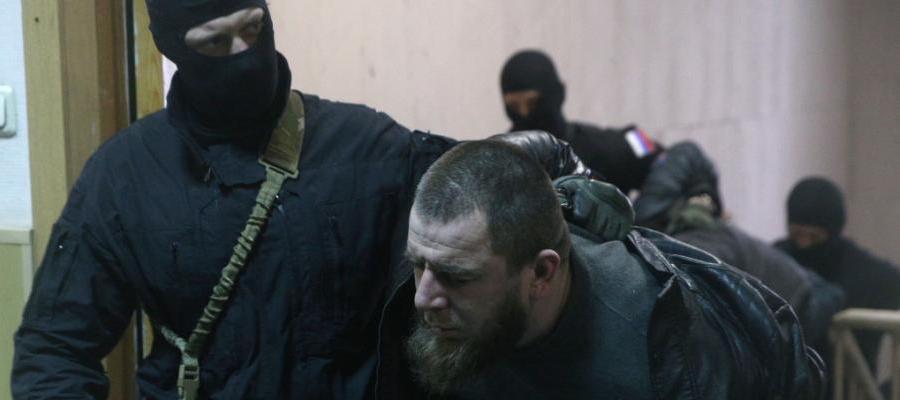
The European Court of Human Rights posed questions to Russian authorities concerning the application from Temirlan Eskerkhanov, one of the convicts in the case of assassination of Boris Nemtsov in 2015. Eskerkhanov reported that after apprehension he was subjected to tortures by law-enforcement officers of several agencies at the same time, however, the Investigative Committee did not check this application appropriately.
As we have previously reported, according to Eskerkhanov, who applied to the Moscow branch of the Committee Against Torture in 2015 for legal assistance, during his apprehension in Moscow on 7 March 2015, unidentified people in badgeless uniform and in civilian clothes beat him up, threatened him with physical violence and pointed a gun at him. In addition, they asked him questions concerning the Boris Nemtsov assassination.
According to Eskerkhanov, he spent over an hour on the floor head down wearing undergarment, his hands were handcuffed behind his back. Subsequently, he was taken to the Chief Department of the Investigative Committee of Russia, in addition, on the road Eskerkhanov was also beaten up and his hair torn out, and the abuse was recorded on the mobile phones cameras.
Next time, according to Eskerkhanov, he was beaten up at the Investigative Committee: he was made standing facing the wall and the investigators were beating him at internal sides of his thighs, at the same time, they were threatening him with rape and physical violence. Subsequently, Eskerkhanov was taken into custody and put to the temporary detention cell, where, as he claims, he failed to make the doctors register his bodily injuries, instead, the officers who delivered him, were present during the examination and filmed him naked on the mobile phones.
On 8 March 2015, Eskerkhanov was delivered to the Basmanny District Court of Moscow. He claims that during transportation to the building of the court and back he was subjected to physical violence by the convoy. Several times they hit him with fists in the stomach, as well as made several blows with machine-guns at his ribs because he did not want to answer their questions. Then, one of the convoy officers took a lighter from his colleague, brought it to the face of the applicant and put his beard on fire, after that he ran with his hand over his beard several times, having put the fire off. In addition, the convoy officers were insulting the applicant with foul language and threatened him with physical violence.
Having initiated a public investigation, human rights defenders immediately faced with difficulties and reluctance of the official investigative authorities to conduct a check with regard to Eskerkhanov’s application concerning brutal treatment by the law-enforcement officers.
“Senior investigator for major cases with the Chief Investigative Department of the Investigative Committee of the RF colonel of justice Aleksey Stadnikov completed the check of a crime report within a month and issued a refusal to open a criminal case, – lawyer with the Committee Against Torture Sergey Babinets recalls. – When we familiarized with the materials of the check, we found out that the investigator ignored Eskerkhanov’s words on how he was abused at the Basmanny District Court. In addition, he did not identify or question the convoy officers, failed to assign a medical forensic examination of Eskerkhanov, failed to perform examination of the scene of the incident, did not seize the records of the video surveillance cameras in court, did not establish or question the FSB officers who apprehended Eskerkhanov”.
This refusal to initiate criminal proceedings was repeatedly appealed against to the superiors of investigator Stadnikov and to the court. Lawyers with the Committee Against Torture together with lawyers Olga Golub and Rosa Magomedova passed all the instances and, as a result, submitted a complaint to the Supreme Court of Russia. However, they did not succeed in quashing the refusal.
In June 2016, human rights defenders and lawyers applied to the European Court of Human Rights with a complaint in the interests of Temirlan Eskerkhanov. In July 2020, this application was communicated. The court posed the following questions to the Russian authorities:
– regarding the events of March 7 and 8, 2015, was the applicant subjected to tortures, inhumane or degrading treatment while remaining in custody in violation of Article 3 of the Convention? As to procedural defense from inhumane or degrading treatment, was the investigation conducted by the national authorities in this case compatible with the requirements set forth in Article 3 of the Convention (the Government is requested to provide all the materials related to the events from 7 to 8 March 2015)?
– were the conditions of the applicant’s custody in the court building, his transportation to the court building and back in compliance with Article 3 of the Convention?
– were the conditions of the applicant’s transportation after passing of sentence from 16 to 28 April 2018 and from 2 to 25 April 2019 in compliance with Article 3 of the Convention?
– did the applicant had effective domestic remedy available with regard to his application about brutal treatment as it is required by Article 13 of the Convention?
– did the applicant have a fair court examination according to items 1 and 3 b) and с) of Article 6 of the Convention? In particular, it relates to keeping the applicant in a glass cabin and metal cage during the court hearing of the court of the 1-st instance and the appellate instance; was the applicant provided with sufficient time and possibility for preparing his defense and maintaining confidential communication with his defense lawyer?
As we have previously reported, the European Court communicated the complaint of Zaur Dadayev, another participant of the Boris Nemstov assassination case.